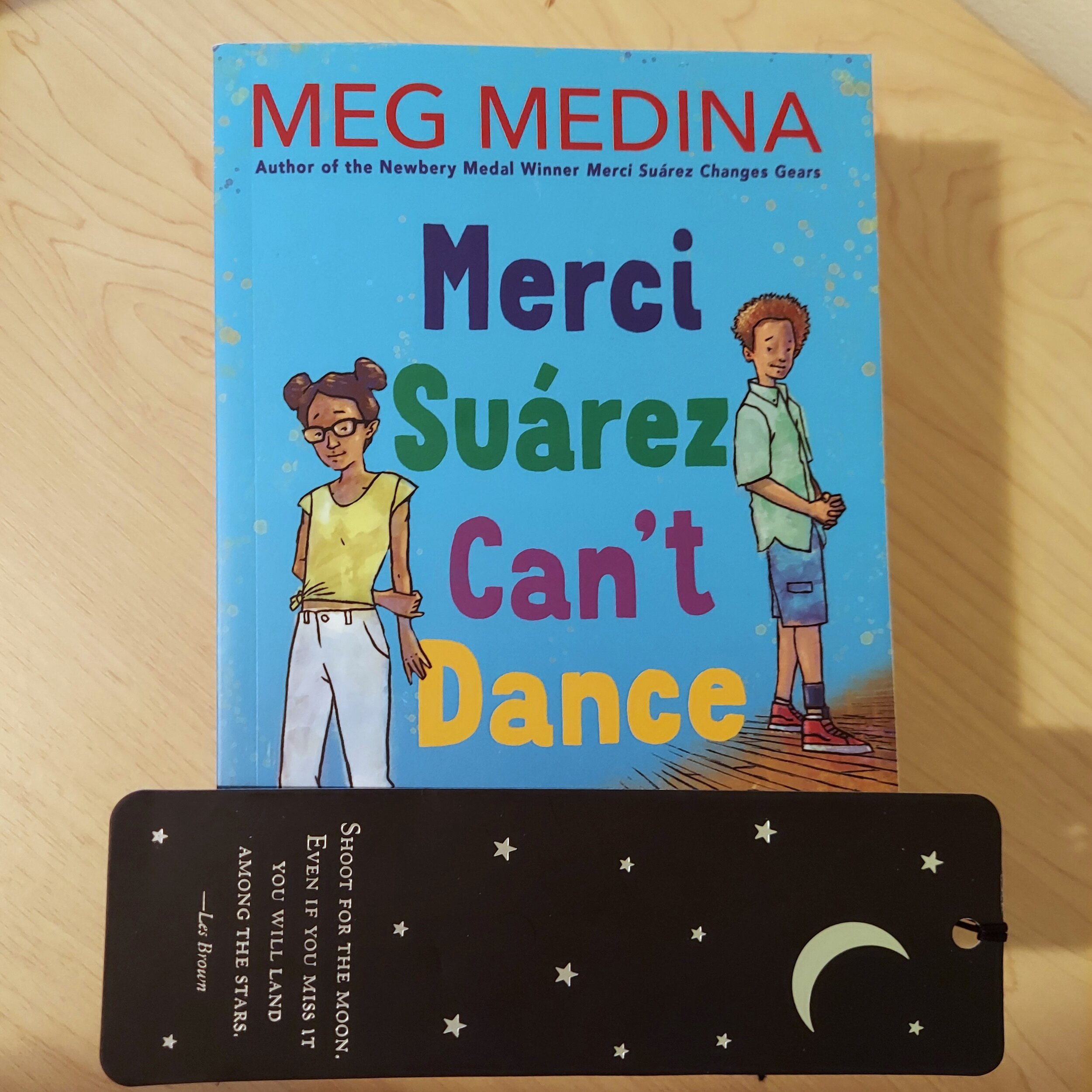Growing up requires constant change, as author Meg Medina demonstrates it in Merci Suárez Can’t Dance. This middle-grade book is the second installment in the Merci Suárez verse, following Cuban-American Merci Suárez as she cruises through the seventh grade. Mercedes “Merci” Suárez is a young girl who is trying to keep everything as it’s always been within her family and friends—from tía Inés’s routine at the bakery to her friendship trio with Hannah and Lena. This moving middle-grade novel is not only about life’s inevitable change; it invites young readers to explore business smarts, love, selflessness, cultural education, socio-economic status, confidence, and standing up for oneself. Everything changes for Merci Suárez and she must learn to dance to the changing beat of growth.
Taking place in South Florida, Merci begins seventh grade assigned as a business manager to the school store, The Ram Depot, with new student, Wilson Bellevue. They’re expected to work together as a team to “hone their business and math skills and get real-world experience”, according to Miss McDaniels. Merci immediately demonstrates superb sales and critical-thinking skills, necessary in business. Merci’s abilities have the potential to motivate young readers to learn more about the professional world at a deeper level, outside of their regular classes. “Fix your mistakes in style. Two-for-one erasers! Wile supplies last! (See? An eraser would have helped!),” Merci writes on a sign for the store with the commerce goal to sell erasers for her school.
Credit: Yvonne Tapia
Initially, Merci is hesitant to work alongside a seventh grade boy, considering her distasteful experience with “annoying jokes about farting” and similar shenanigans from other male peers. However, when she starts feeling shy and embarrassed about anything that has to do with Wilson Bellevue, Merci begins to wonder why that is so. While her reactions to people’s comments on their relationship may not show her best character, young readers will be satisfied with this (possible) realistic context about discovering young love.
Mercedes may be family-dedicated and a hard-working student, but sometimes that can be overwhelming for her when her family members pull her in different directions simultaneously. Besides her schoolwork, Merci is expected to help take care of her twin cousins, Axel and Tomás, who are as energetic as kids can be, while emotionally affected by her grandfather’s Alzheimer’s, and, processing her tía Inés’s new love life. But when Merci tries to find out more about her tía’s personal life, they tell her not to get involved. To this, Merci thinks, “People ask me private stuff all the time. What I want to be. If I have a boyfriend. Nobody seems to mind their invasion of my privacy.” Moreover, when she sees that her older brother, Roli, is different to how she remembers him before he went to college, Merci says, “Nobody is the way they’re supposed to be.” Medina offers a deep and pragmatic view about what many emerging young adults are anticipated to handle, that may often be overlooked.
Credit: Candlewick Press
The author expertly encourages themes of self-confidence through Merci’s school rival, Edna Santos, and dancing. In Merci’s point-of-view, Edna is her total opposite; Edna knows French and attends ballet lessons, while Merci helps her father figure out job bids and write ad copy, and certainly can’t dance. She also makes Merci feel as if her best friend, Hannah, would rather hang out with Edna with each passing day. Edna does her fair share of verbal bullying as she tries to boss Merci around. As young readers rotate pages, they’ll encounter a poignant scenario—Edna and Merci are paired as science lab partners, and when Edna tries to verbally put her down, Merci must be willing to use the power within her to stand up for herself.
Merci’s determined attempts to avoid dancing are humorously engaging. Dancing is first tied to Merci’s lifestyle when the school’s famous Valentine’s Day Heart Ball takes place, and Merci is not having it, she says, “It’s like smearing cod liver oil all over my favorite candy bar. I can’t get past it.” Yet, she is ironically invited by Edna to participate in an unexpected way. Later on, her tía Inés decides to open up her own Latin dance school, and Merci is challenged to help it be a success. Merci’s narration, filled with humor and sass, will make the journey enjoyable and illuminating for young readers.
Meg Medina delivers an authentic middle-grade experience on every level—from school’s demands to family events—that young readers can relate to. Merci Suárez Can’t Dance is a stellar sequel that welcomes readers to embrace change, and shows them how to find their own dancing beat. This is an essential read for young students and their families, and should have a place in each classroom, library, bookstore, and personal shelf.
For more updates on her latest works, follow author Meg Medina on:
Twitter: @Meg_Medina
Instagram: @megmedinabooks
Website: http://www.megmedina.com/
Yvonne Tapia is a Mexican-American professional from East Harlem, New York. She earned a BA in Media Studies and Psychology from Hunter College. Additionally, she has worked in the educational and media fields through various outlets. With a long-term enthusiasm for children’s media, she has been involved at Housing Works Bookstore and Latinx in Publishing. She currently works on the Marketing and Publicity team at Levine Querido. Yvonne is excited about the power of storytelling, and to engage content awareness in underrepresented communities.










